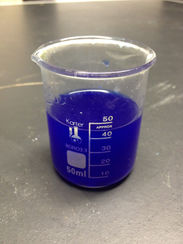Difference between revisions of "Schweizer's reagent"
| Line 1: | Line 1: | ||
[[File:Schweizer's reagent.JPG|thumb|244x244px]] | [[File:Schweizer's reagent.JPG|thumb|244x244px]] | ||
| − | '''Schweizer's reagent''' is a deep-blue solution of the coordination complex [[ | + | '''Schweizer's reagent''' (sometimes written as '''Schweitzer's reagent''') is a deep-blue solution of the coordination complex '''[[Tetraamine copper(II) complex|tetraammine copper(II)]] hydroxide'''. This solution can be produced by dissolving [[copper(II) hydroxide]] in an excess of [[ammonia]]. It is notable for its ability to dissolve [[cellulose]], and a solution of cellulose in Schweizer's reagent can be used to manufacture rayon fiber by injecting it into [[sulfuric acid]] solution. |
| + | |||
| + | ==Properties== | ||
| + | ===Chemical=== | ||
| + | Schweizer's reagent will decompose if heated to give off ammonia. | ||
| + | |||
| + | ===Physical=== | ||
| + | Schweizer's reagent''' is a deep-blue solution, with a strong ammonia smell. It can be dried in an ammonia stream, and it's crystals are only stable under excess ammonia. | ||
| + | |||
| + | ==Availability== | ||
| + | Schweizer's reagent is best made that purchased. | ||
| + | |||
| + | ==Preparation== | ||
| + | Schweizer's reagent can be made by bubbling [[ammonia]] through a [[copper(II) hydroxide]] solution. Adding [[copper]] metal to a solution of ammonia also yields the complex, though this process takes a long time. | ||
==Projects== | ==Projects== | ||
*Produce [[rayon]] | *Produce [[rayon]] | ||
| + | |||
| + | ==Handling== | ||
| + | ===Safety=== | ||
| + | Tetraammine copper(II) hydroxide solutions give off ammonia fumes which are irritant and toxic. | ||
| + | |||
| + | ===Storage=== | ||
| + | Best stored in closed bottles or tubes, and kept away from heat. Dry crystals should be kept in an ammonia atmosphere in closed containers. | ||
| + | |||
| + | ===Disposal=== | ||
| + | Heating the compound causes it to release ammonia and leave behind copper(II)hydroxide or oxide. | ||
| + | |||
| + | ==References== | ||
| + | <references/> | ||
| + | ===Relevant Sciencemadness threads=== | ||
| + | *[http://www.sciencemadness.org/talk/viewthread.php?tid=21021 Isolation of Schweizer's Reagent] | ||
| + | *[http://www.sciencemadness.org/talk/viewthread.php?tid=62176 schweizer's reagent] | ||
| + | *[http://www.sciencemadness.org/talk/viewthread.php?tid=19130 Synthesis of Schweizers Reagent then Precipitation of Rayon by Acidification] | ||
[[Category:Chemical compounds]] | [[Category:Chemical compounds]] | ||
Revision as of 13:23, 30 September 2015
Schweizer's reagent (sometimes written as Schweitzer's reagent) is a deep-blue solution of the coordination complex tetraammine copper(II) hydroxide. This solution can be produced by dissolving copper(II) hydroxide in an excess of ammonia. It is notable for its ability to dissolve cellulose, and a solution of cellulose in Schweizer's reagent can be used to manufacture rayon fiber by injecting it into sulfuric acid solution.
Contents
Properties
Chemical
Schweizer's reagent will decompose if heated to give off ammonia.
Physical
Schweizer's reagent is a deep-blue solution, with a strong ammonia smell. It can be dried in an ammonia stream, and it's crystals are only stable under excess ammonia.
Availability
Schweizer's reagent is best made that purchased.
Preparation
Schweizer's reagent can be made by bubbling ammonia through a copper(II) hydroxide solution. Adding copper metal to a solution of ammonia also yields the complex, though this process takes a long time.
Projects
- Produce rayon
Handling
Safety
Tetraammine copper(II) hydroxide solutions give off ammonia fumes which are irritant and toxic.
Storage
Best stored in closed bottles or tubes, and kept away from heat. Dry crystals should be kept in an ammonia atmosphere in closed containers.
Disposal
Heating the compound causes it to release ammonia and leave behind copper(II)hydroxide or oxide.
